150 Best Literary Criticism Jokes and Puns Guaranteed to Make You Think and Chuckle
Ever feel like literary criticism is a bit… intense? Like, maybe a little too much dissecting and not enough delight? Well, prepare to have your academic funny bone tickled! We’re diving headfirst into the delightful world of literary criticism jokes and puns, where deconstruction meets dad jokes.
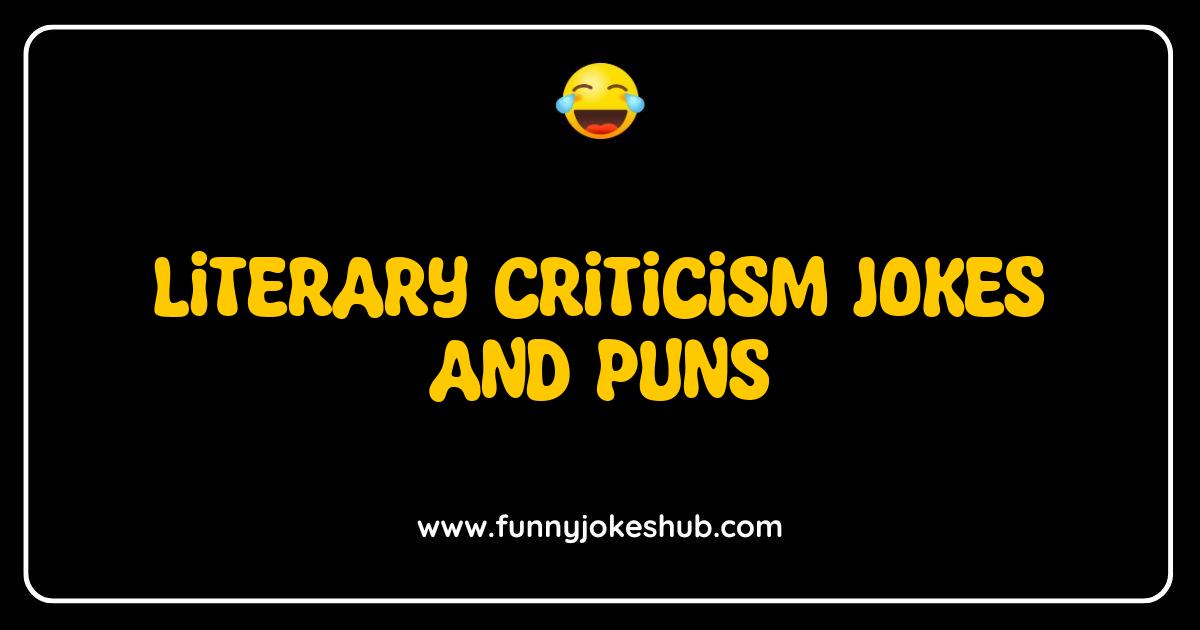
Get ready for some truly groan-worthy (but secretly hilarious) wordplay. We’ll explore the lighter side of analyzing texts, proving that even the most serious literary theories can be fodder for a good chuckle. From Freud to feminism, no critical approach is safe from our pun-tastic treatment.
So, if you’re a lit nerd with a sense of humor (or just someone who needs a break from all that highbrow stuff), this is the post for you. Let’s get literary and laugh a little!
Best Literary Criticism Jokes and Puns Guaranteed to Make You Think and Chuckle
- Why did the literary critic break up with the simile? Because she said their relationship was “like,” well, everything else.
- I tried to write a deconstructionist joke, but it fell apart.
- A structuralist walks into a bar and orders a drink. He says, “I’ll have one unit of fermented beverage, please.”
- My friend tried to write a Marxist literary analysis, but he kept getting bogged down in class struggles. It was a real bourgeois-ie.
- What’s a literary critic’s favorite type of music? Genre-bending stuff.
- A postmodernist and a formalist are arguing. The formalist says, “Your readings are all relative!” The postmodernist replies, “Says who?”
- I told my friend I was writing a paper on the symbolism of apples in literature. He said, “That sounds core-y.”
- “I’m reading a feminist critique,” she said. “It’s really empowering,” I responded. “You go, girl,” she added. “Yeah, but not like… too ‘go-girl,’ I mean, gotta avoid essentialism,” she replied.
- Why did the critic refuse to read the romance novel? It had too many plot holes. He said it was a “narrative deficiency.”
- What did the book say to the literary theorist? “You always take me out of context!”
- My literary critique was so groundbreaking, it accidentally became a new genre.
- A postcolonial critic and a new historicist walk into a library. They immediately start arguing about whose historical context is more relevant. It was quite the textual clash.
- A reader asks a critic, “Do you think this book is any good?” The critic replies, “Well, let’s first examine the socio-political implications of your question…”
- I saw a book on literary theory at the bookstore and thought, “That’s a real page-turner…or maybe a page-analyzing, meta-textual-deconstructing-turner.”
- What do you call a literary critic who loves puns? A “pun-dit.”
Literary Criticism Puns: A Comedic Analysis
Ever wondered why “deconstruction” sounds like a demolition job? “Literary Criticism Puns” dives into that humor, dissecting jokes about theory with the precision of a close reading. It’s a comedic analysis of critical terms, finding the punny potential in everything from “Freudian slips” to “post-colonial irony.” Prepare for a laugh-out-loud…
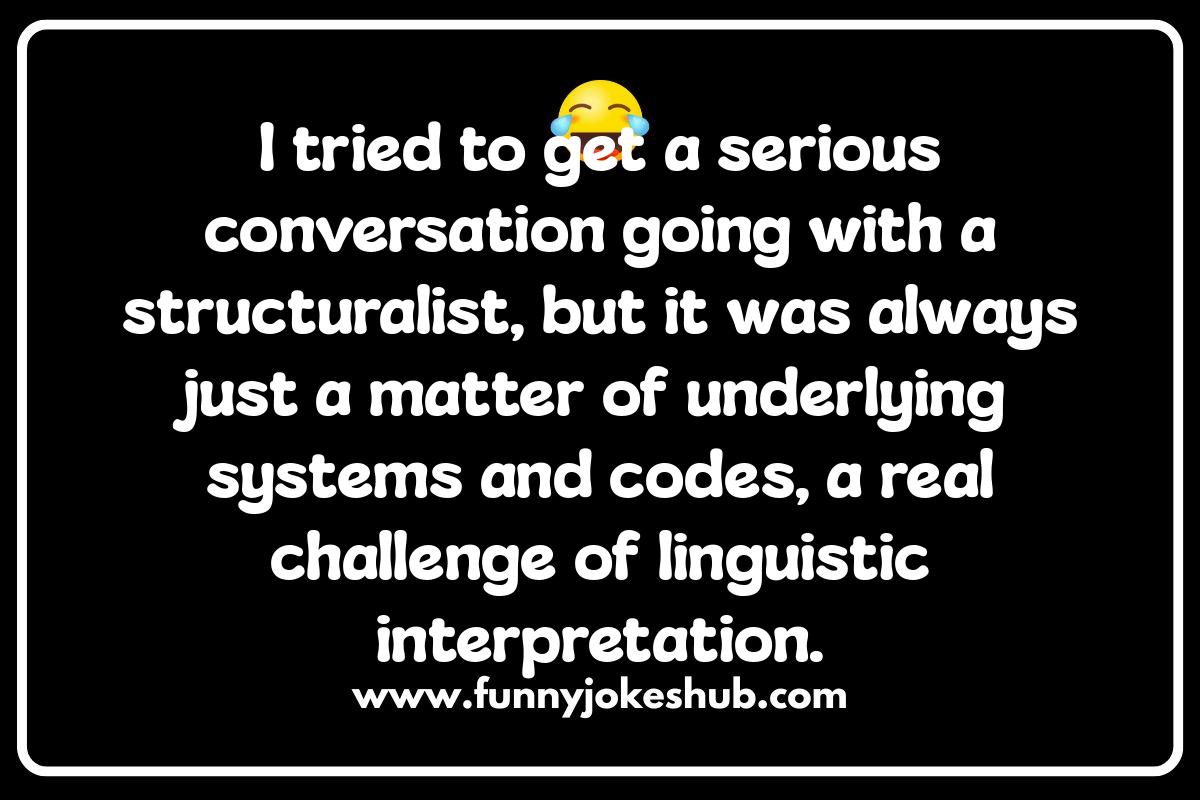
- I tried to get a serious conversation going with a structuralist, but it was always just a matter of underlying systems and codes, a real challenge of linguistic interpretation.
- Why did the New Critic get such a bad reputation as a detective? He always ignored the context and just focused on the text itself.
- A postcolonial critic walks into a bar and orders a drink, but then spends the rest of the evening deconstructing the power dynamics of the establishment.
- My friend tried to explain Reader-Response theory, but I found it all a bit too subjective and personal, a real challenge of interpretation.
- I tried to write a feminist literary critique, but it was a bit too patriarchal for my liking, a real challenge of perspective.
- A psychoanalytic critic walks into a library and asks for books about repressed desires, the librarian whispers, “They’re right behind you…in the Gothic fiction section.”
- Why did the deconstructionist get such bad reviews as a furniture maker? He said all the chairs were just texts and therefore had no stable meaning.
- I wanted to debate with a Marxist literary critic, but it was always just a class struggle to get my point across.
- A formalist and a poststructuralist were arguing about a poem. The formalist said, “Your reading is completely arbitrary!” The poststructuralist replied, “Says who?”
- I tried to have a serious conversation with a historical materialist, but it was always about economic conditions and the means of production, a real challenge of historical context.
- Why did the queer theory critic get fired from the dating app? He said all the profiles were just performative acts and lacked authenticity.
- A new historicist walks into a library and asks for books about the past, the librarian whispers, “They’re all right behind you, in the primary source section”.
- My friend tried to write a biographical interpretation of a poem, but it was a real authorial fallacy to assume that the author’s life was the only key to understanding the text.
- I tried to explain ecocriticism to my dog, but he just kept sniffing the leaves, a real disconnect between human interpretation and nature.
- A structuralist walks into a bar and orders a drink. He says, “I’ll have one unit of fermented beverage, please,” a real emphasis on the underlying patterns.
Exploring the Lighter Side: Literary Criticism Jokes
Ever feel like literary criticism takes itself a bit too seriously? Dive into the lighter side! We’re not dissecting texts with scalpels here, but tickling them with puns and jokes. From deconstructing deconstruction to playfully poking at post-colonialism, these comedic takes remind us that even the most profound ideas can…
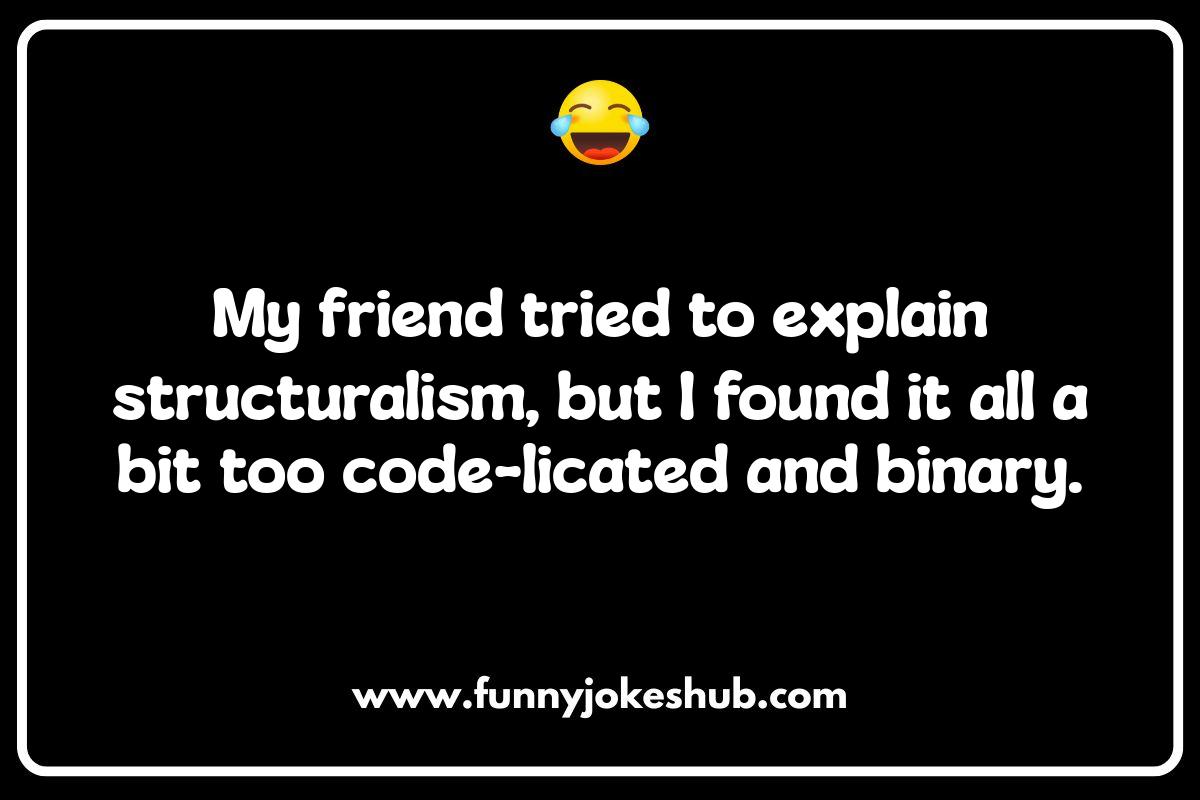
- My friend tried to explain structuralism, but I found it all a bit too code-licated and binary.
- What did the postcolonial critic say to the Victorian novelist? “Your narrative is a bit too ‘imperial’ for my taste.”
- A reader-response theorist walks into a library and asks for books, but then spends the entire visit just thinking about her own experience of reading.
- A Formalist and a Deconstructionist are having a debate, the Formalist says, “Your readings are all relative!” The Deconstructionist replies, “What do you mean by ‘relative’?”
- Why did the Marxist critic get fired from the theater? He kept pointing out the exploitation of the actors on stage.
- My attempt at a feminist literary analysis ended up being a bit too patriarchal for my liking, a real challenge of perspective and a power struggle of voice.
- What did the psychoanalytic critic say to the character with a tragic flaw? “Tell me about your mother…”
- I tried to explain New Historicism to my dog, but he just kept sniffing the past.
- A queer theory critic walks into a bar and orders a drink, but then spends the rest of the evening questioning the heteronormativity of the establishment.
- My friend tried to write a literary critique using only post-structuralist terminology, but it was a complete deconstruction of meaning and a real mess of language.
- I asked a deconstructionist for a definition of love, but he just said it was a social construct, devoid of any inherent meaning.
- What do you call a group of literary critics who can’t agree on a single interpretation? A real text-ual conflict.
- Why was the New Critic so bad at parties? He always ignored the context and just focused on the text in front of him.
- I tried to write a literary critique of a book about a sentient chair, but it was difficult to find any real depth, it was a bit too surface level.
- A phenomenological critic walks into a library and asks for books, but then spends the entire visit just thinking about her own experience of the library.
Decoding Humor: Literary Criticism and Wordplay
Ever chuckled at a literary pun? “Decoding Humor” explores how critics analyze wordplay, revealing the clever mechanics behind our laughs. It’s not just about funny lines; it’s about understanding how authors use language to create meaning, even through jokes. Think of it as literary criticism, but with a punchline, or…
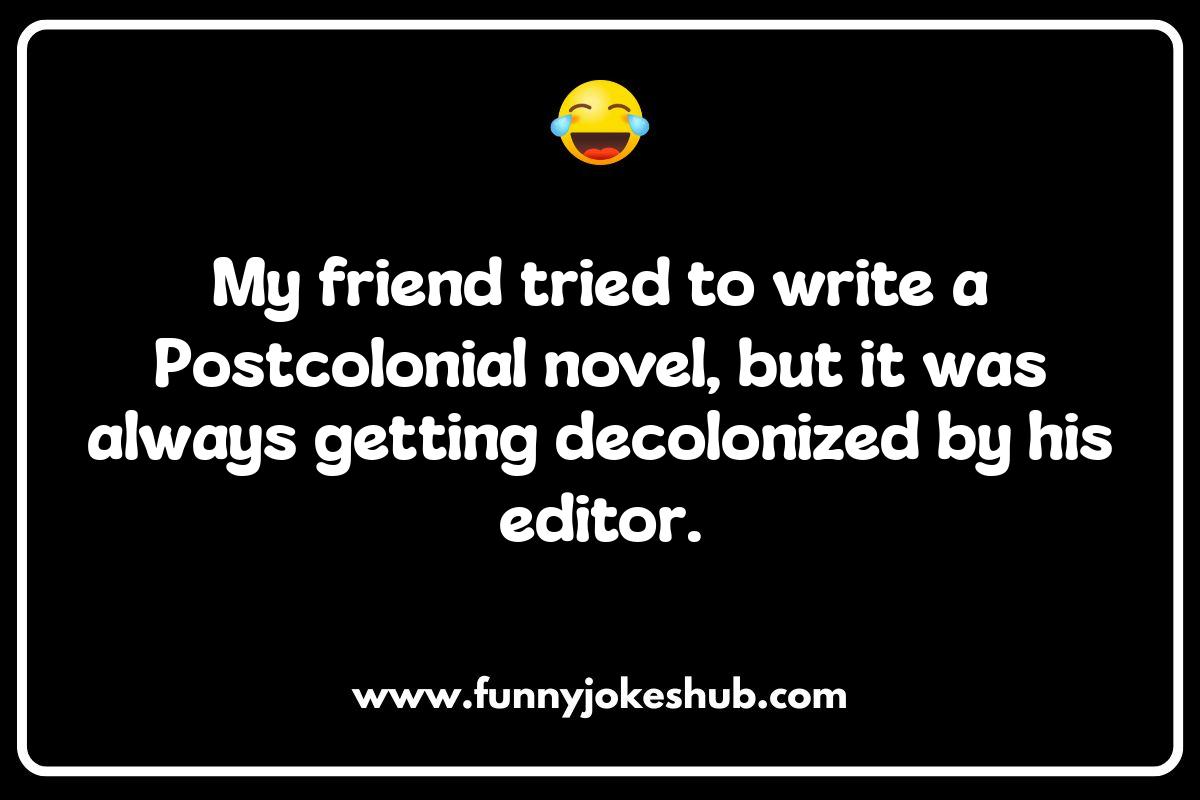
- My friend tried to write a Postcolonial novel, but it was always getting decolonized by his editor.
- A Formalist and a Structuralist walk into a bar, the bartender says, “We’ve got a great system here.” The Formalist replies, “I’ll just stick to the text, thank you.”
- I tried to explain Reader-Response Theory to my parrot, but he just kept repeating back what I said.
- The New Critic was terrible at reviewing restaurants; he only focused on the plating and ignored the taste.
- Why did the Marxist critic get fired from the bakery? He kept trying to seize the means of dough production.
- My therapist told me to embrace my inner deconstructionist, so now I just question everything, even the meaning of therapy.
- What do you call a group of Feminist critics arguing? A real power struggle of voices.
- A Psychoanalytic critic walks into a bar, orders a drink, and says “Tell me about your mother…”
- My friend tried to write a New Historicist novel, but it was always getting lost in the historical context.
- I tried to write a queer reading of a children’s book, but it ended up being a bit too subversive for the target audience.
- A structuralist was trying to explain the plot of a novel, but it was all a system of signifiers and signifieds, it was hard to follow the main story.
- I tried to get a job as a literary critic, but they said my analysis lacked the necessary *close reading* skills, a real challenge of interpretation.
- What did the Postmodern critic say when asked if his work was meaningful? “Well, that’s a matter of perspective, isn’t it, and perspective is just another construct, devoid of any inherent meaning.”
- My friend tried to explain phenomenology, but it was all a bit too subjective and personal, a real experience of self-interpretation.
- The archetypal critic was having a bad day, he said all the stories he was reading felt like they were all the same, a real myth-take of a career.
Theorizing Laughter: Literary Criticism’s Funny Bone
Who knew literary theory could be so…hilarious? “Theorizing Laughter” dives into the serious side of chuckles, exploring how humor functions in texts. It’s like literary criticism finally found its funny bone! Forget dry analyses; this book unpacks the mechanics of mirth, revealing the power of jokes and puns beyond just…

- A Structuralist walks into a bar, orders a drink, and says, “I’ll have one unit of fermented beverage, please, and make it a signifier of my thirst.”
- My friend tried to write a Marxist critique of a children’s book, but it just kept ending up with a lot of class-conscious cookies.
- What did the Formalist say to the Deconstructionist? “Your readings are all relative!” The Deconstructionist replied, “Says who? And what do you mean by ‘reading’, and what is ‘relative’?”
- I tried to get a job as a psychoanalytic critic, but my interpretations were always a bit too Oedipal.
- Why was the New Historicist so bad at telling jokes? He kept getting lost in the historical context and forgetting the punchline.
- A reader-response theorist walks into a library and asks for books, but then spends the entire visit just thinking about her own experience of reading.
- I asked a postcolonial critic about his favorite author, and he said, “It’s complicated, and depends on which power structures are being reinforced.”
- Why did the feminist critic refuse to read that novel? She said the text was too patriarchal and needed a radical deconstruction of its gendered power dynamics.
- A queer theorist was trying to explain gender, but it was a bit too fluid and non-binary for me.
- My friend tried to explain the concept of the ‘gaze’, but I found it all a bit too voyeuristic.
- I tried to get a job as a literary theorist, but my application was rejected; they said my ideas lacked sufficient ‘intertextuality’.
- The New Critic was terrible at reviewing movies; he only focused on the mise-en-scène and ignored the plot.
- What’s a poststructuralist’s favorite type of music? Anything that’s deconstructed and has no fixed meaning.
- Why did the phenomenologist get lost in the library? He kept getting too caught up in the experience of finding the books and couldn’t get to the point of reading.
- A narratologist walks into a bar and asks for a drink. The bartender says, “What’s your story?”
Critical Comedy: When Literary Theory Gets Joked
Ever chuckled at a deconstructed metaphor? That’s the spirit of “Critical Comedy.” It’s where literary theory, often dense and serious, gets a playful twist. We’re talking jokes about post-structuralism, puns on the patriarchy, and ironically applied Marxist critiques. It’s a way to engage with complex ideas through laughter, making even…
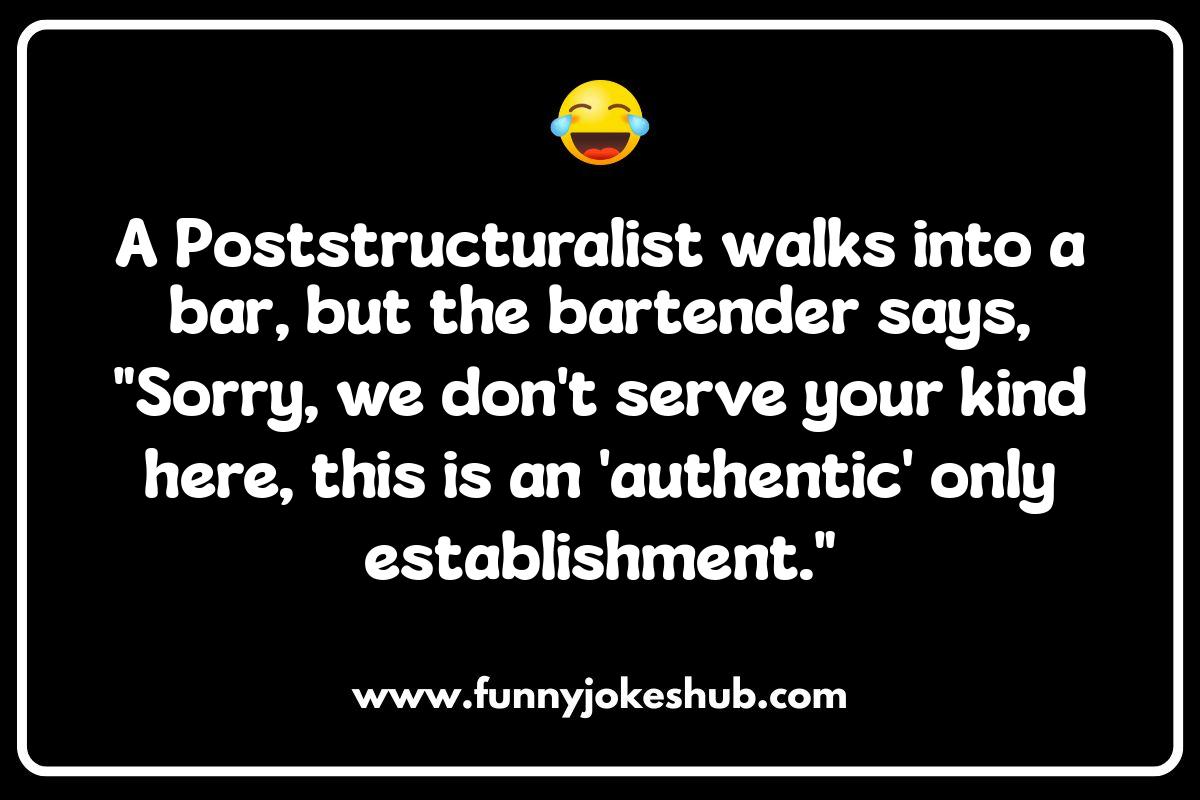
- A Poststructuralist walks into a bar, but the bartender says, “Sorry, we don’t serve your kind here, this is an ‘authentic’ only establishment.”
- Why did the New Critic refuse to go on a road trip? He said he preferred to stick to the text, and not worry about the surrounding context of the road.
- My attempt at explaining phenomenology to my cat was met with a blank stare, a real void of feline understanding.
- I tried to get a serious conversation going with a Marxist literary critic, but it was always about class struggles, a real proletariat-ical debate.
- What’s a reader-response theorist’s favorite type of party? Anything that’s all about their own personal experience.
- A Formalist and a Deconstructionist are having a debate: the Formalist says, “Your readings are all relative!” The Deconstructionist replies, “What do you mean by ‘readings’? And, for that matter, what is ‘relative’?”
- Why did the archetypal critic get such a bad reputation as a detective? He always got lost in the collective unconscious and forgot to solve the crime.
- I tried to write a feminist literary critique, but it was a real *patriarchal* task to untangle the power structures.
- The psychoanalytic critic was terrible at giving advice: he just kept saying, “Tell me about your childhood.”
- Why was the structuralist so bad at making friends? He kept analyzing all their interactions, and reducing them to binary opposites.
- My friend tried to explain the authorial fallacy, but I found it a bit too author-itarian and confusing.
- A postcolonial critic walks into a bar, orders a drink, and then spends the rest of the evening deconstructing the power dynamics of the establishment, a real site of resistance.
- Why was the first deconstructionist so bad at building furniture? He kept questioning the very nature of the instructions and the meaning of assembly.
- I asked a Queer theorist for dating advice, but they said, “It’s all about challenging the heteronormative structures, and maybe finding someone who isn’t a binary of expectations.”
- My attempt to explain semiotics to my dog ended with a lot of tail wags and a real disconnect between signifier and signified.
Pun-tastic Readings: Literary Criticism’s Humorous Edge
Ever felt literary criticism could use a laugh track? “Pun-tastic Readings” explores the lighter side of analysis, proving that even dense texts aren’t immune to a good pun. We’re diving into the world of “Literary Criticism Jokes and Puns,” where wordplay meets weighty themes, and maybe, just maybe, we’ll finally…

- A Structuralist walks into a bar, orders a drink, and says, “I’ll have one unit of fermented beverage, please, and make it a signifier of my thirst, a real system of needs.”
- A Postcolonial critic was asked about their favorite author, they replied, “It’s complicated, and depends on which power structures are being reinforced, a real question of perspective and bias.”
- Why did the Formalist refuse to go on a road trip? He said he preferred to stick to the text, and not worry about the surrounding context of the road, a real focus on the intrinsic and the structure.
- What did the New Critic say when he found a typo in his own work?: “Aha! A textual anomaly, a deviation from the ideal form! This requires further scrutiny, a real focus on the text itself.”
- I tried to explain Reader-Response theory to my parrot, but he just kept repeating back what I said, a real challenge of interpretation and meaning.
- A Psychoanalytic critic walks into a bakery and orders a cake, but then spends the whole time thinking about its symbolic representation of his mother, a real complex of dessert and desire.
- Why did the Feminist critic get such a bad review? She kept dismantling the patriarchal structures of every text she encountered, a real challenge to the status quo.
- A Deconstructionist walks into a library and asks for books, but then spends the entire visit questioning the meaning of the books, the library, and even the concept of reading itself, a real challenge of interpretation.
- My friend tried to write a Marxist critique of a children’s book, but it just kept ending up with a lot of class-conscious cookies, a real struggle to balance theory and practice.
- Why was the Postmodernist so bad at following directions? He kept questioning the very nature of the map and the existence of a destination, a real challenge of fixed meaning and purpose.
- I tried to discuss a novel with a member of the Frankfurt School, but their responses were always so critically theoretical, it was hard to decipher their meaning, a real challenge of decoding complex ideas.
- A Phenomenological critic walks into a restaurant and orders food, but then spends the entire meal just thinking about her own experience of eating, a real journey into subjective understanding and perception.
- My friend tried to explain semiotics to his dog, but it was a real disconnect between signifier and signified, a real challenge of communication and understanding.
- A narratologist walks into a bar and orders a drink, the bartender says, “What’s your story?” and the critic just smiles and says, “Ah, that’s the question, isn’t it?”
- What did the Post-Structuralist say when he lost his car keys? “Well, this is a deconstructed experience, the signifier of my vehicle has been separated from its signified, a real crisis of meaning and location.”
Satire and Scholarship: Literary Criticism Jokes in Context
“Satire and Scholarship” explores how literary criticism jokes aren’t just silly wordplay; they’re often sharp social commentary. These puns and quips, when examined in context, reveal underlying anxieties about academic trends and power dynamics. It’s like a secret language, where humor unpacks the sometimes-pretentious world of literary analysis.
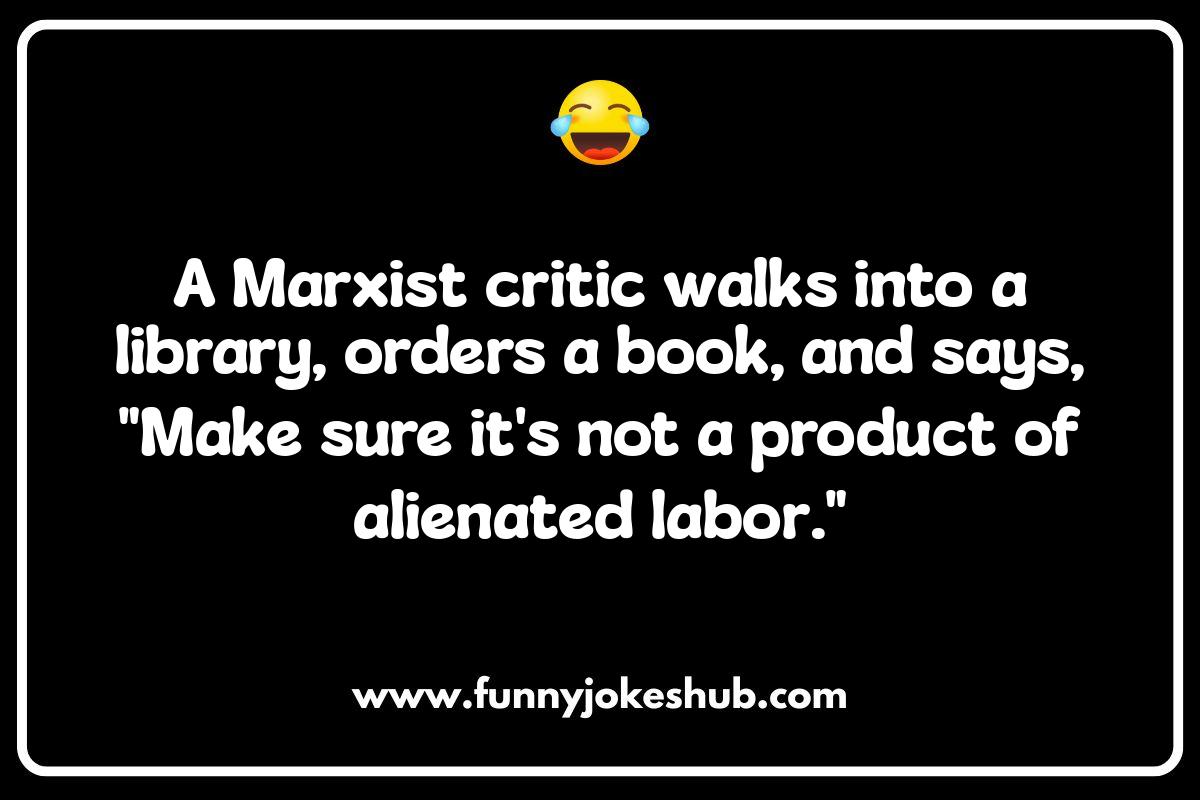
- A Marxist critic walks into a library, orders a book, and says, “Make sure it’s not a product of alienated labor.”
- A postcolonial critic walks into a bar, orders a drink, and then proceeds to deconstruct the establishment’s power dynamics, leaving everyone feeling a bit too exposed.
- Why did the New Critic refuse to go to the beach? He said he preferred to stick to the text and not worry about the surrounding context of the sand.
- A psychoanalytic critic was having trouble with his car, he said it was a real complex of repressed mechanical desires.
- My friend tried to write a deconstructionist poem, but it just kept unraveling and questioning its own meaning, a real text-ual crisis of purpose.
- A feminist critic tried to write a children’s book, but it was a challenge to avoid reinforcing patriarchal stereotypes and gendered power dynamics, a real struggle of representation and voice.
- What’s a narratologist’s favorite type of party? One with a clear beginning, middle, and end, and a well-defined narrative arc.
- I tried to start a book club with some phenomenologists, but it was a bit too focused on subjective experience and individual interpretation, a real challenge to find common ground and shared meaning.
- A structuralist was trying to explain his theory, but I found it all a bit too code-licated and binary, a real challenge of signifiers and signifieds.
- A reader-response theorist walks into a library and asks for a book, but then spends the entire visit just thinking about her own experience of reading.
- My friend tried to write a biographical interpretation of a poem, but it was a real authorial fallacy to assume that the author’s life was the only key to understanding the text, a real challenge of textual analysis.
- A formalist and a historical critic were having a debate, the formalist said “Your readings are all context!” The historical critic replied, “Says who? And what is ‘context’?”
- Why did the Marxist critic get such bad reviews? He was always trying to find class struggles in every text, a real battle of ideologies and economic power.
- A queer theorist was asked about their favorite literary genre, they said, “Anything that challenges heteronormative structures and defies traditional categories, a real exploration of fluidity and identity.”
- A poststructuralist walks into a bar and orders a drink, but then spends the rest of the evening questioning the very nature of the drink, the bar, and even the concept of a bar.
Analyzing the Absurd: Finding the Funny in Literary Criticism
Literary criticism can feel serious, but sometimes it’s wonderfully absurd! “Analyzing the Absurd” reminds us that even weighty texts have their funny angles. Think of it like finding the punchline in a dense novel, or spotting the ironic twist in a critical essay. When we playfully dissect literary theory, we…
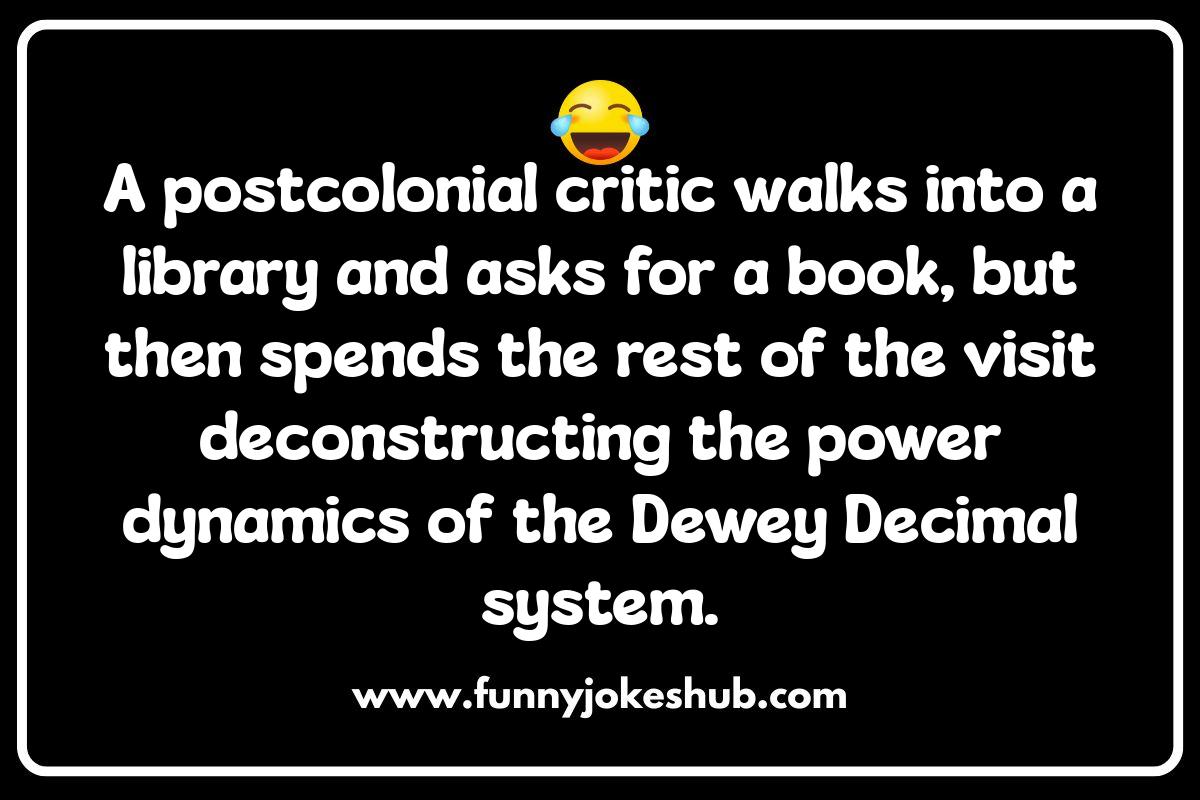
- A postcolonial critic walks into a library and asks for a book, but then spends the rest of the visit deconstructing the power dynamics of the Dewey Decimal system.
- I tried to get a book recommendation from a Structuralist, but he just kept talking about the underlying binary oppositions, a real signifier of boredom.
- A Formalist and a Reader-Response theorist were having a debate, the Formalist said, “Your interpretation is completely subjective!” The Reader-Response theorist replied, “That’s… like… your opinion, man.”
- My friend tried to explain the complexities of deconstruction, but it just kept unraveling and questioning its own meaning, a real text-ual crisis of purpose.
- I asked a psychoanalytic critic about his favorite author, he said, “It’s complicated, and I think it all stems from his mother.”
- Why did the New Critic refuse to go to the art museum? He said he preferred to stick to the text and not worry about the surrounding context of the paintings, a real adherence to the form.
- I tried to write a literary critique using only Marxist terms, but it just ended up being a class struggle of words, a real proletariat of analysis.
- A feminist critic was trying to explain the patriarchy, but I found it all a bit too power-struggling.
- A narratologist walks into a bar and orders a drink, but then spends the rest of the evening analyzing the narrative structure of the bartender’s greeting.
- Why was the archetypal critic so bad at parties? He kept trying to reduce everyone to their Jungian archetypes, a real collective unconscious experience of awkwardness.
- My attempt to write a biography using only intertextual references ended up being a real quote-astrophe of ideas, a true labyrinth of borrowed words.
- I tried to get a straight answer from a post-structuralist, but he just kept questioning the meaning of my question, a real challenge of language and purpose.
- A queer theorist was trying to explain gender, but it was all a bit too fluid and non-binary for me, a real spectrum of identities and expressions.
- Why did the deconstructionist break up with the text? He said their relationship was too unstable and lacked any fixed meaning, a real challenge of interpretation.
- I asked a phenomenological critic about their favorite book, but they just spent 20 minutes describing their experience of reading it, a real self-reflective journey into the text.






